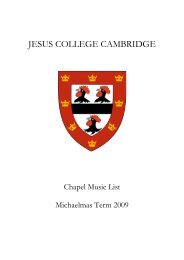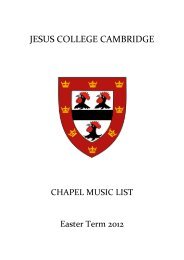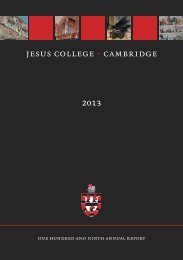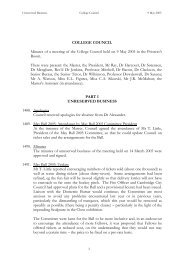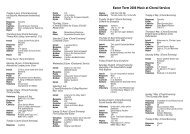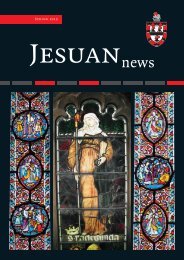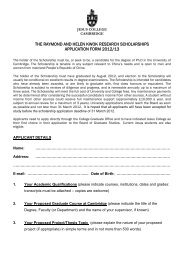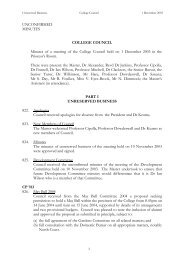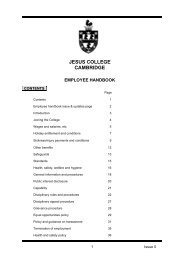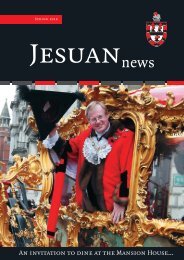2012 Annual Report - Jesus College - University of Cambridge
2012 Annual Report - Jesus College - University of Cambridge
2012 Annual Report - Jesus College - University of Cambridge
Create successful ePaper yourself
Turn your PDF publications into a flip-book with our unique Google optimized e-Paper software.
44 DICKENS AND JESUS I <strong>Jesus</strong> <strong>College</strong> <strong>Annual</strong> <strong>Report</strong> <strong>2012</strong><br />
Dickens – The <strong>Jesus</strong> Connection<br />
Stephen Heath<br />
It seems appropriate in the bicentenary year<br />
<strong>of</strong> Dickens’s birth to think about the great<br />
novelist’s connection with <strong>Jesus</strong> – but what<br />
connection could there possibly be?<br />
Dickens’s relations with <strong>Cambridge</strong>, let alone<br />
with this <strong>College</strong>, were limited. He visited the<br />
town for a couple <strong>of</strong> hours in 1849 on his way<br />
home from a trip to Norfolk, and he gave<br />
public readings in the town in 1859 and 1867.<br />
These were a huge success, the Guildhall<br />
packed full, with hundreds unable to gain<br />
admission. The colleges, Dickens reported,<br />
had ‘mustered in full force from the biggest<br />
guns to the smallest’, so doubtless at least<br />
some Jesuans will have been present, whether<br />
inside or out. The main, direct <strong>Cambridge</strong><br />
connection begins in 1868, when his sixth<br />
and youngest son, Henry, won a scholarship<br />
to Trinity Hall. His other sons had been<br />
disappointing - though later the fifth was to<br />
become a Canadian Mountie hero! Of Henry,<br />
however, Dickens was proud, bent on him<br />
achieving distinction: ‘if he fail to set to in<br />
earnest, I shall take him away’. A week after<br />
Henry came up, Dickens sent him 3 dozen<br />
bottles each <strong>of</strong> sherry and claret, 2 dozen<br />
bottles <strong>of</strong> port, and 6 bottles <strong>of</strong> brandy - not<br />
perhaps the most obvious means for<br />
ensuring the required earnestness. Henry<br />
nevertheless did distinguish himself, both in<br />
the <strong>University</strong> and in his subsequent career:<br />
he was called to the Bar, took silk, was<br />
appointed Common Serjeant, sat as an Old<br />
Bailey judge, and received a knighthood. Of<br />
course, many <strong>of</strong> the people Dickens knew in<br />
his life in London as a writer and public figure<br />
were <strong>Cambridge</strong> educated and here it is that<br />
the <strong>Jesus</strong> connection can be made, since,<br />
happily, two <strong>of</strong> the most important men in<br />
his life were Jesuans.<br />
The first <strong>of</strong> these was John Forster, longstanding<br />
friend and adviser on whom<br />
Dickens depended. Born in Newcastle and<br />
educated at the city’s Royal Grammar School,<br />
Forster came up to <strong>Jesus</strong> in 1828, but found<br />
the expenses at the <strong>University</strong> to be ‘very<br />
John Forster<br />
great’ and the world <strong>of</strong> ‘the cloistered<br />
bookworm’ quite out <strong>of</strong> touch with ‘the real<br />
business <strong>of</strong> life’. Accordingly, he left after a<br />
few weeks to study law at London’s new<br />
<strong>University</strong> <strong>College</strong>. He did not, though,<br />
follow a legal career, choosing instead the life<br />
<strong>of</strong> a man <strong>of</strong> letters, writing himself,<br />
contributing to various papers and journals,<br />
and above all providing counsel and practical<br />
help to many <strong>of</strong> the writers <strong>of</strong> the day,<br />
Dickens above all. The two met towards the<br />
end <strong>of</strong> 1836 and from then on Forster was<br />
intimately involved in Dickens’s life and<br />
work, – conducting negotiations with<br />
publishers, looking over in manuscript or<br />
pro<strong>of</strong> everything he wrote, helping in family<br />
crises, in all matters indispensable. The<br />
intimacy survived even the shock <strong>of</strong> Forster’s<br />
marriage - he the confirmed bachelor, secure<br />
in his chambers at 58 Lincoln Inn’s Fields<br />
(the model for Mr Tulkinghorn’s chambers<br />
in Bleak House); told <strong>of</strong> the marriage, Dickens<br />
‘lay down flat, as if an Engine and Tender had<br />
fallen on me’. After Dickens’s death Forster



